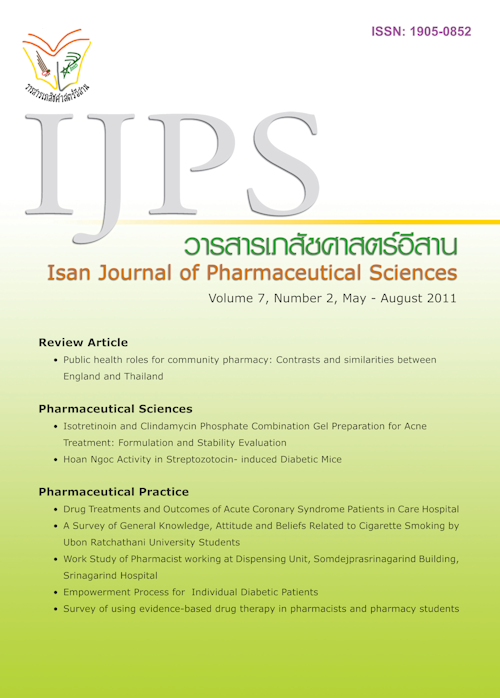A Survey of General Knowledge, Attitude and Beliefs Related to Cigarette Smoking by Ubon Ratchathani University Students
Main Article Content
Abstract
Introduction: The study aimed to assess knowledge, attitudes and belief related to cigarette smoking by Ubon Ratchathani University students to make feasible strategies for a further quit smoking program. Materials and Method: The target group was Ubon Ratchathani University students divided into 3 different groups: health science, science and technology, social science. It was a cross-sectional, descriptive study. A questionnaire survey was implemented to measure knowledge, attitude and beliefs related to cigarette smoking. A descriptive analysis and rating scales were used for data analyses. Results: There were 120 volunteers enrolled into study and each group had 40 volunteers. It was shows that all three different groups had an average mean level of knowledge as understandably good. Regarding smoking behavior, they mostly were non-smokers (96 persons), only 23.3 % (28 persons) of those are still current smokers. Nevertheless, mean scores of both attitudes toward smoking and factors related to quitting smoking were “good” levels. Within current and former smokers (28 persons), only 16 can quit cigarette smoking due to health issues (Mean score= 3), as well as, the effect on closed contact persons (Mean score = 2.89±0.46). Noticeably, friends, family members, and healthcare workers are the important factors to help quit smoking successfully. Conclusion: All study data imply further quit smoking campaigns via proper knowledge, attitude, and beliefs.
Article Details
In the case that some parts are used by others The author must Confirm that obtaining permission to use some of the original authors. And must attach evidence That the permission has been included
References
ABC poll Research Center. Attitudes toward addictive substances among teenage [Online] ABC poll 2007 [cited 2006 May 15]. Available from: http://www.abacpoll.au.edu/seminar/special/main2550.html.
Centers for Disease Control and Prevention (CDC). National Center for Chronic Disease Prevention and Health Promotion. Screening to Prevent Cancer Deaths. CDC Online Newsroom 2008 [cited 2009 Nov 17]. Available from: http://www.cdc.gov/media/pressrel/2008/r080313.htm.
Chudej S. Factors involved in smoking behavior of King Mongkut’s University of Technology Thonburi students. KMUTT Research and Development Journal 2004; 1: 95-114.
Kantasiri L. Smoking behaviors and risk factors among university students Chiang Mai University. [Thesis of Master Degree in Public Health]. Chiang Mai: Chiang Mai University; 2007.
Lohakit S. Attitudes toward cigarette smoking of first year university students, Chiangmai University and Mae-Jo University. [Thesis of Master Degree in Science]. Chiang Mai: Chiang Mai University; 2005.
National Statistical Office, Ministry of Information Communication and Technology, Thailand. A national survey of smoking and drinking behaviors of Thai population in 2004 [cited 2010 Jun 28]. Available from: http://service.nso.go.th/nso/ns_ocenter/project/search_center/23project-th.htm.
Pagdeepairoj S. Attitudes related smoking behavior of Chiang Mai University students. [Thesis of Master Degree in Economics]. Chiang Mai: Chiang Mai University, 2007.
Prasomsak S. Factors, effects of cigarette smoking, and smoking behavior of private university students, Bangkok. St. John University, Thailand.2007.
Siripchot P. Prevalence, knowledge, attitudes related to smoking behavior of Mathayom 3 students, Janokrong, Phitsanulok. An Annual Student Research Project 2010. Janokrong High School, Phitsanulok; 2010.
Supawong C, Baulai S, Tantiket N. Smoking behavior of Thai teenage. Nonthaburi: Medical ScienceDepartment, Ministry of Public Health, Thailand.1997 [cited 2010 Nov 10]. Available from: http://advisor.anamai.moph.go.th.
Suthiprasert T. Factors related to smoking behaviors of technology college students, Suphanburi. Medical Social Unit, Yomraj Chaopraya Hospital. Thai J Health Promot Environ Health 2001; 24(1): 20-24.
Suwantherangkool J. Factors related to smoking behaviors among high school students. Chiang Mai Med J 2000; 39: 9-19.
Thedrapimethaweenomchai S, Deepoon M, Mansaeng P. Smoking behavior and quit smokingtemptation of vocational college students,Ubon Ratchathani province. UBU Journal 2006;4(5): 17-22. Tobacco Control Research and Knowledge Management Center (TRC). Smoking Cessation Online Service (SCOS) [cited 2010 Aug 10]. Available from: http://www.medcenter-ubon/sc.
Viriyachaiyo V, Lim A. Attitudes towards smoking and health of faculty personnel, medical students and hospital clients at the Faculty of Medicine, Prince of Songkla University, Hat Yai, Thailand. Songkla Med J 2006; 24(3): 205-14.
Watanasirichaikul S. Textbook of Tobacco Consumption Control for Health Care Students and Professionals, 1st ed. Thai Health Alliance Against Tobacco: Bangkok Press; 2006.
West R, Shiffman S. Smoking cessation: fast facts. Oxford: Health Press, 2007.
Wisutyothin Y. Smoking behavior of teenage in target areas, Department of Prevention and Control 9 (DPC), Phitsanulok. Department of Prevention and Control 9, Phitsanulok. 2007.]
WHO Report on the Global Tobacco Epidemic, 2009. Implementing smoke-free environments. World Health Organization. WHO Report on the Global Tobacco Control, 2009.
World Health Organization (WHO). An annual report: The role of health care professionals in to-bacco control. Health Professional against Tobacco. World Health Organization, 2007.


